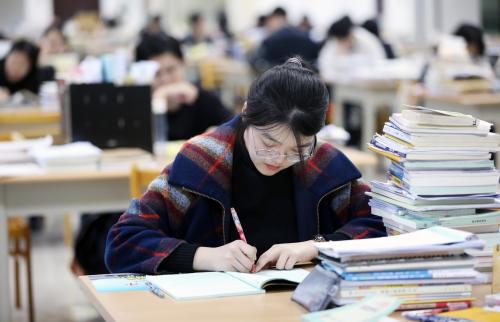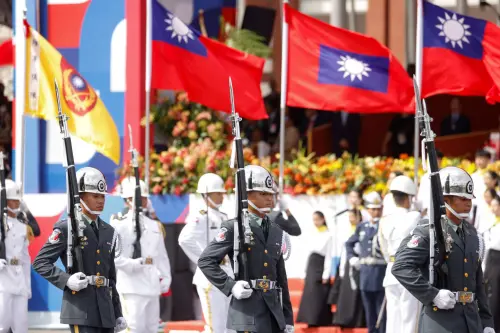As the people of Taiwan prepare to select their next president this weekend, all eyes are on Beijing’s reaction to the election results and what this means for U.S.-China relations. Washington and Beijing are acutely aware of the sensitive year ahead, which is why both sides carefully choreographed a smooth summit between Presidents Joe Biden and Xi Jinping in San Francisco last November after relations hit rock bottom following the Chinese spy balloon crisis in early 2023.
While the bilateral summit exceeded expectations — with Beijing promising to curb the export of fentanyl precursors and agreeing to reopen communication channels between the two militaries that it cut after House Speaker Nancy Pelosi’s visit to Taiwan in 2022 — the summit did not chip away at both sides’ deeply entrenched threat perceptions. It also did not set an ambitious agenda for the year ahead. Rather, the objective was and remains risk management.
The focus on preventing the relationship from spiraling further makes sense, given intense U.S.-China competition. But without a more proactive agenda beyond consultations, not to mention longstanding areas of tension from trade to Taiwan threatening to flare at any moment, both leaders will struggle to convincingly make the case at home that continued diplomacy with the other side is worth the effort and not coming at the expense of national interests.
Deep mutual skepticism remains
The desire to stabilize relations is genuine on both sides. In the days following the San Francisco summit, one felt a palpable sense of relief in both bureaucracies that the meeting, which capped off months of shuttle diplomacy, was a success. During my trip to China in December, nearly everyone I encountered — from policy experts to businesspeople to students and cab drivers — asked whether U.S.-China relations might improve in the coming months. This interest wasn’t surprising given many Chinese believe their country’s development and economic fate still heavily depend on good relations with the United States and the West.
But even as most Chinese support stabilizing ties with the United States, the entrenched view in Beijing and across the broader Chinese public remains that the U.S. desire to preserve its “global hegemony” is depriving “China’s right to develop,” and that no amount of reassurance from Chinese leaders or a change in U.S. administrations will shift Washington’s basic direction.
Negative perceptions of China are also at historic highs among Americans. A poll conducted last fall by the Chicago Council on Global Affairs found that 58% of Americans see “China’s development as a world power” as a serious threat, and only 19% have “a great deal” or “a fair amount” of confidence that China will “responsibly deal with world problems.” A recent bipartisan report released by the House Select Committee on the Strategic Competition Between the United States and Chinese Communist Party (CCP) called on Washington to undertake a “fundamental reevaluation” of its economic relationship with China, asserting that the United States has a twofold choice: either “accept Beijing’s vision of America as its economic vassal” or “stand up for our security, values and prosperity.”
Both political systems understand clearly that the other side is unlikely to budge on key issues. Beijing wants Washington to drop export controls on advanced chips, sanctions on Chinese companies like Huawei, and tariffs on Chinese imports; to curb its support for Taiwan; and to stop criticizing China’s human rights record. Washington wants China to stop coercively advancing its claims vis-à-vis Taiwan and in the East and South China seas, to curtail its unfair trade policies and non-market economic practices, and to drop its strategic partnership with Russia. There is zero chance Beijing or Washington will concede to the other’s demands in the foreseeable future.
The risks of risk aversion
Given this context, neither Washington nor Beijing has high hopes for the bilateral relationship in 2024. As Ambassador Nicholas Burns put it at a Brookings event last month, he is “not optimistic” but “realistic” about the U.S.-China relationship. His comments aptly reflect the sentiment in both capitals.
The upside is that both sides share low expectations — it’s often when expectations are mismatched that there’s turbulence. They are clear-eyed about their differences. Neither Biden nor Xi seeks to trigger a larger conflict, and both leaders have endorsed using working-level exchanges to manage friction.
The downside is that there is little incentive for either side to pursue a more proactive agenda. Such an approach would admittedly be riskier but could give leaders more to point to when skeptics question the utility of maintaining stable ties. As Treasury Secretary Janet Yellen remarked in her speech on the U.S.-China economic relationship last month, “continuing to stabilize our relationship to prevent escalation” is incredibly important, but it “won’t make news.” The pressure will be higher on Biden as the leader of a democracy, who faces political attacks accusing him of pursuing “zombie engagement” and “appeasing” Beijing.
The two lines of cooperation thus far — coordination on counternarcotics and the resumption of military dialogue — are off to a good but complicated start. Beijing has cracked down on the manufacture and export of fentanyl precursors, but experts caution that controlling a fragmented chemical and drug industry will be challenging, disappointing those who seek immediate, comprehensive results. Also, while Beijing has toned down its public remonstrations that Washington is “blaming China for its own fentanyl problem,” the underlying view in China that Beijing is “helping” the United States solve a crisis of its own making creates a shaky foundation for cooperation.
Military-to-military communications have resumed, with the Chairman of the Joint Chiefs of Staff General Charles Q. Brown Jr., and his Chinese counterpart, General Liu Zhenli, speaking for the first time in late December. After months of U.S. calls to restore communication channels, the Chinese political system seems to have accepted the dangers of not talking. Among Xi’s “five pillars for China-U.S. relations” that were presented in San Francisco, the second involves “more communications, more dialogues and more consultations” to manage disagreements. But the view in China remains that if Washington would simply “respect China’s territorial sovereignty and maritime rights,” there would be no need for hotlines or risks of escalation.
In short, both counternarcotics cooperation and military dialogue are still viewed by the Chinese as U.S. asks, benefiting Washington more than Beijing. As such, the temptation for Beijing to walk away when the relationship hits turbulence will be strong.
The upcoming bilateral dialogue on managing artificial intelligence (AI) risks may prove to be a more promising avenue of cooperation with potential discussions on keeping AI out of nuclear command and control systems, among other safety norms. Given the sensitivities around AI technology and binding agreements, it is unclear whether AI cooperation can serve as a bright spot in an otherwise challenged relationship.
Lamentably, Beijing seems to have little interest in coordinating with Washington on global crises, whether on the wars in Ukraine and Israel-Gaza, or North Korea and Iran’s nuclear programs. While the United States and China do not see eye-to-eye on any of these crises, the two states share broad interests in maintaining global stability and preventing proliferation. Beijing’s general posture that Washington is to blame for these conflicts and must first address their “root causes” is wrong and incredibly reckless. The failure of the world’s two greatest powers to coordinate on such pressing challenges casts further doubt on the notion that better U.S.-China relations are good for the two countries and the rest of the world.
Taiwan still looms
Washington and Beijing are wary of potential turbulence following the Taiwan elections, especially as leaders in both capitals face domestic pressure to avoid “looking weak.” China has continued to send military aircraft, naval vessels, and balloons into the Taiwan Strait. Its Taiwan Affairs Office recently denounced Democratic Progressive Party candidate Vice President William Lai, who leads polls, as a “destroyer of peace across the Taiwan Strait.” A Chinese official recently warned that the Taiwanese people must make the “correct choice” if they seek to avoid “war” and “decline.”
While a maximally violent reaction by Beijing in response to the election is looking less likely, Xi and the CCP have already backed themselves into a corner by discrediting Lai as a “troublemaker” and a “separatist.” If Lai wins, Beijing will believe it has no choice but to react to Lai’s every move — his statements, policies, and diplomatic exchanges — that it deems as asserting Taiwan’s independence. If there’s one issue that heightens emotions in China, it’s Taiwan, which disincentivizes moderation below the threshold of war.
In the U.S. political arena, Taiwan has become a litmus test of how tough U.S. leaders are on China. Aggression by Beijing will put pressure on Biden, the GOP candidates, and other U.S. leaders to take higher-profile steps in support of Taiwan, spurring further reactions from Beijing. Such action-reaction dynamics will diminish the prospects for thoughtful discussions in the United States around Taiwan policy amid a shifting military balance in the Taiwan Strait, and limit space for the consideration of reassurance measures by Beijing, Taipei, and Washington for maintaining the cross-Strait status quo.
U.S.-China relations on the brink?
It’s quite possible that another spy balloon-like crisis or escalation in the usual hotspot — whether in the Taiwan Strait or the South or East China seas — could spark a crisis that neither U.S. nor Chinese leaders can easily deescalate given domestic political dynamics. At that point, even if the two sides can avoid a major conflict, the incentives for re-stabilizing the relationship (after two recent failed attempts) will be all but nil, extinguishing prospects for “responsibly managing” U.S.-China competition for at least the near term. A silver lining is that leaders on all sides — in Beijing and Washington, as well as in Taipei — are keenly aware of the fragility of this current moment of stabilization. When challenges arise, as they inevitably will, the hope is that these leaders can act as statesmen, not politicians, to pull the relationship back from the precipice.
The Brookings Institution is committed to quality, independence, and impact.
We are supported by a diverse array of funders. In line with our values and policies, each Brookings publication represents the sole views of its author(s).








Commentary
The US-China relationship in 2024 is stabilized but precarious
January 12, 2024